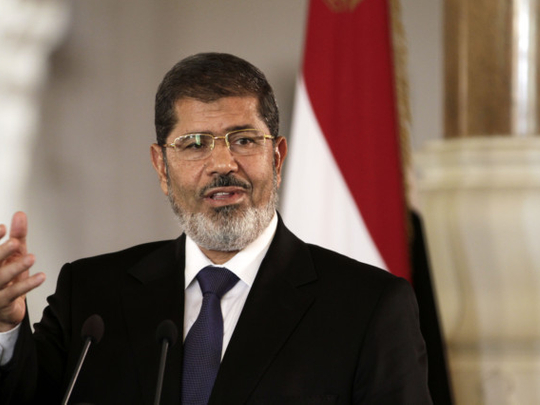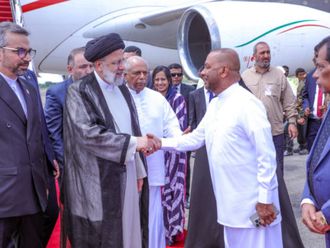
Cairo: Some members of a high-level commission that issued a report detailing security abuses and atrocities during and after Egypt’s 2011 uprising accused President Mohammad Mursi on Saturday of ignoring their findings.
The fact-finding commission, comprised of judges, security officers, rights lawyers and families of victims, was formed last year by Mursi to investigate rights violations that took place from the beginning of the revolt that toppled longtime president Hosni Mubarak until the end of the nearly 17 months of military rule that followed.
Mursi formed the commission a month after he won elections in June, vowing to install justice and look into thousands of violations against protesters. But two years since Mubarak’s ouster, rights groups complain of a lack of transitional justice to hold Mubarak and other former officials accountable for crimes committed during the revolution.
The findings have put Mursi in a sensitive position. He needs the backing of the powerful military and loyalty from the police, but following up on the commission’s findings would likely bring a backlash from the generals and police officials.
The commission said its final 700-page report was presented to Morsi about three months ago.
However, an official in the president’s office told The Associated Press that Mursi’s office never received the report. Mursi instructed the commission to submit its findings directly to the state prosecutor’s office, according to the official who was not authorized to speak to the media and spoke only on condition of anonymity.
The rights group, “We Are After You for the Report,” which includes some members of the investigative commission as well as rights advocates, said Mursi had failed to disclose the commission’s findings.
“He did not send the report to the proper state institutions, such as the upper house of parliament to change laws, and did not transform this report into an action plan to reshape the security apparatus,” said Ahmad Ragheb, a lawyer on the commission and member of the rights group.
“To the contrary, the state is trying now to arm the police even more and trying to support the institutions that are responsible for killing people,” he said during a news conference on Saturday.
The group said the fact-finding commission’s recommendations could have placed Egypt on the right track to shift key institutions away from autocracy and impunity. The group noted that the fact-finding commission had proposed a draft transitional justice law.
“But the president did not have enough wisdom and political will to make this shift,” the group said in its statement.
The commission’s report could be a key factor in presenting new evidence in Mubarak’s retrial for his alleged role in the killing of nearly 900 protesters during the revolt. The former president was found guilty of failing to stop the killings. In January, the verdict was overturned and Mubarak now faces a retrial. He is currently in custody on corruption charges.
Talaat Abdullah, Egypt’s prosecutor general, said Monday in Qatar that the fact-finding commission’s report did not include “evidence,” but had “indications” that his office has studied.
Parts of the report have been leaked during the past several months to media, including some findings. One leaked section reported that the police were behind nearly all the deaths of protesters and used snipers on rooftops overlooking Cairo’s Tahrir Square to shoot into the huge crowds. Another section said Mubarak knew the size of the protests through a live TV feed. Mubarak later denied in court that he knew the extent of the protests and crackdown against them.
Saturday’s news conference comes amid increasing public pressure on Morsi to make the report public, particularly during Mubarak’s retrial.
Ragheb accused Morsi of being responsible for the confusion surrounding the report, and for what he said was hasty reporting based on leaks to the media about the commission’s findings.












